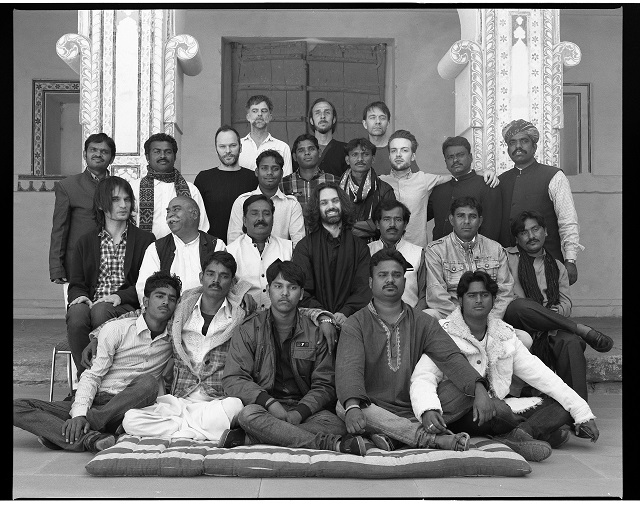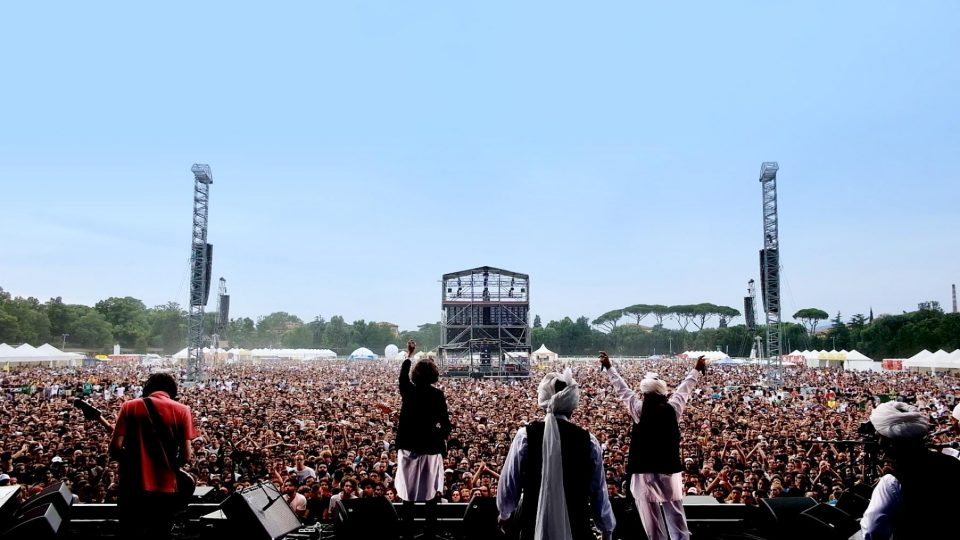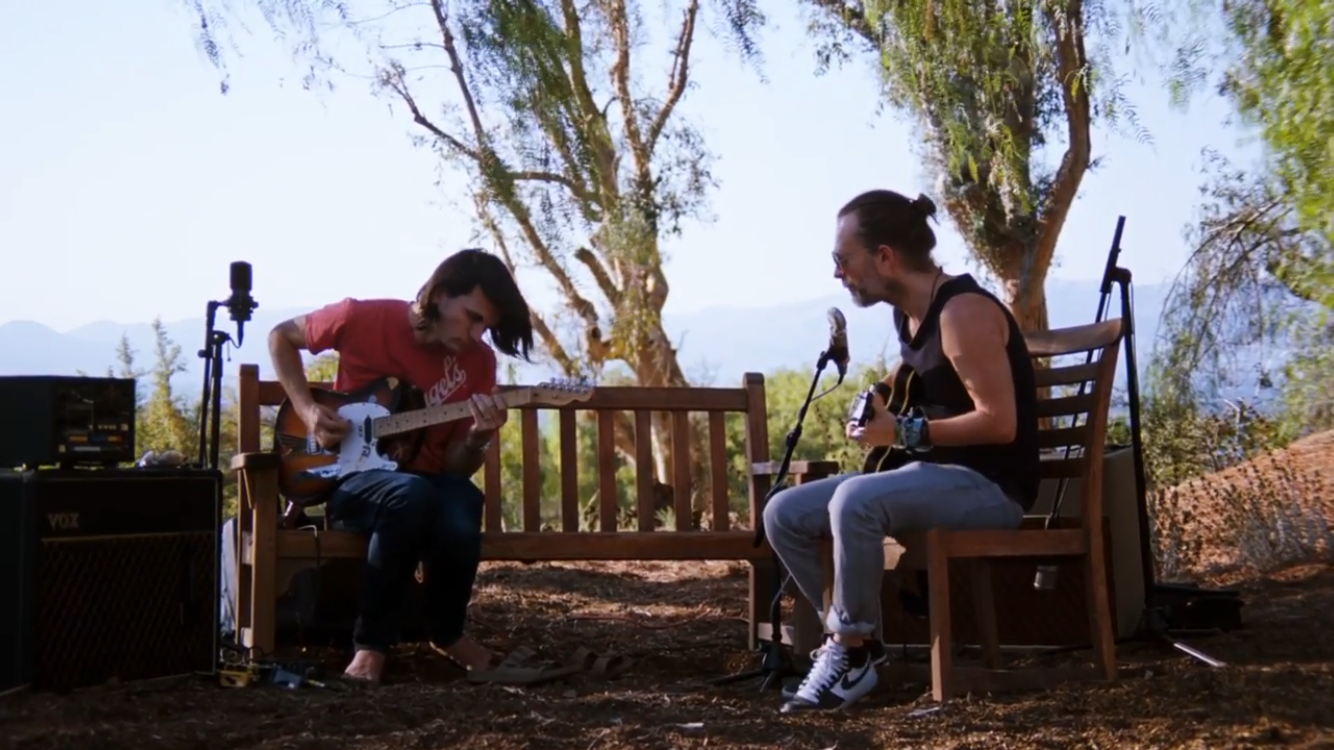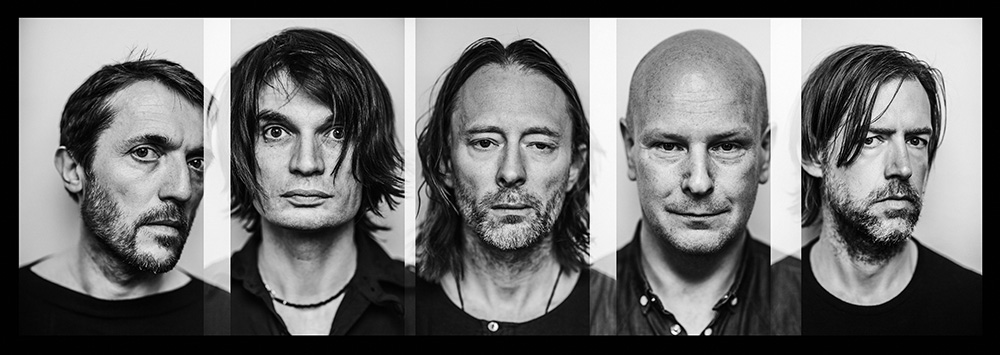Shye Ben Tzur on Politics, Touring With Radiohead and The Rajasthan Express
The Ajmer-based Israeli composer sheds light on the recent controversy around a gig featuring Junun, his collaborative project with Jonny Greenwood

Jonny Greenwood (center, first from left) and Shye Ben Tzur (center, fourth from right) collaborated on ‘Junun’ in 2015 and reunited this year to tour the project as part of Radiohead’s current Europe tour. Photo: Courtesy of the artist
Last week, Radiohead guitarist-composer Jonny Greenwood tweeted, simply and perhaps somewhat questionably, “The Indians are coming”¦.” The tweet was accompanied by a photograph of a group of decidedly non-Radiohead musicians: turbaned, mustachioed, kurta-pajamaed. The whole image, with its artistically aged aesthetic, could have passed for a historical photograph from Rajasthan’s past, if it were not for the presence of Greenwood and a lanky, long-haired Israeli man, who appear nestled in the midst of the turbans and mustaches.
Shye Ben Tzur, the lanky, long-haired Israeli, is the composer behind “Junun,” the project and eponymous album on which he and Greenwood collaborated two years ago along with the pictured Rajasthani musicians, who are collectively known as The Rajasthan Express. Greenwood’s tweet was intended to announce his participation in the six shows where Junun will be opening for Radiohead on their A Moon Shaped Pool Europe tour.
But while the act of opening for his own band may come across as somewhat solipsistic, Greenwood’s self-indulgence stops there. The guitarist-composer seems to have accomplished the all-too-rare feat of bringing Eastern musical traditions to Western stages without making the whole thing about himself (see: George Harrison’s sitar lessons with Ravi Shankar, Paul Simon’s Graceland). Rather, Junun’s clear star is Ben Tzur, whose extensive knowledge of Indian classical music shines through on the 2015 album. Greenwood’s presence in the gritty, unexpected basslines and guitar work is undeniable, but he allows himself the backseat as Ben Tzur and the Indian musicians take the lead.
Ben Tzur is fresh off of opening for Radiohead’s first Europe show of the tour the night before, buzzing with excitement palpable even through his Skype call from Oslo, Norway. “It’s a lot of people who have come to see Radiohead, and we come on stage, and we are so welcomed,” he enthuses. “It was a very warm experience, and after doing yesterday, we are feeling very excited about the upcoming dates as well.”
Radiohead audiences may already be familiar with Junun simply because they religiously follow everything that Greenwood does. But Ben Tzur and the Rajasthan Express have experienced similarly warm receptions at their non-Radiohead tour dates thus far. Junun have been independently touring Europe for about a week now, using a stand-in for Greenwood on the dates where he is not available, and have found surprising success among notoriously fickle festival audiences who are likely only looking for upbeat dance music.
“The thing is that the music, what we play, is extremely upbeat as well, but it’s a different rendition of it,” says Ben Tzur. “When we recorded the project, as Jonny produced it, he said ”˜No drums, no Western drums, we’ll do everything with Rajasthani instruments.’” He points out the festive rhythms in jagrans, mehfils, and other ceremonial, celebratory forms of Indian music. “There, you see that people can really get into a trance, and in some sort of ecstasy,” he says. “So you can imagine, [we’re] bringing that sort of ecstasy to the big stages in festivals, but also giving it another edge with the guitars, and other sounds.”
Though the energy translates well, that’s not to say that the full-blown Rajasthani big band isn’t a completely new concept to European audiences. “I think people here are very surprised,” says Ben Tzur. “Some of the poetry is in Hebrew, some in Hindi and Urdu. It’s quite amazing to see how music can transcend any cultural languages and borders.”
Just as the lyrics are a mish-mash of Ben Tzur’s different spoken languages, The Rajasthan Express aren’t really a traditional Rajasthani band–they’re more of a carefully curated orchestra, hand-plucked from the far reaches of Western’s India’s desert region by Ben Tzur. The Israeli musician currently splits his time between Rajasthan and his home country, and has lived in India for the better part of 20 years now. He made the move to India in his late teens, after being spurred to visit the country when he heard Indian classical music for the first time. “I thought I would go for a few weeks, or a month or so,” says Ben Tzur. “And I stayed for most of my adult life.”

Jonny Greenwood (extreme left) and Shye Ben Tzur (center) at a tour date in Florence in June. Photo: Ian Patrick
Ben Tzur apprenticed himself to classical legends all over India, such as the late vocalist Zia Fariduddin Dagar, who sang and taught in the dhrupad tradition in Bhopal. But he always found himself returning to Rajasthan, and to Ajmer in particular, where his wife’s family is from. Greenwood reached out to Ben Tzur a few years ago, after he learned about the Israeli multi-instrumentalist who was making Rajasthani folk music and listened to his compositions. When Ben Tzur heard that the Radiohead guitarist was interested in setting up a meeting, he immediately agreed, because he knew that Greenwood was a composer in his own right. “We just had a talk about music; musical traditions,” says Ben Tzur. “He was very curious about the way that I approached music and composing my own things.”
Sometime later, Ben Tzur performed in London alongside some Rajasthani folk musicians, and invited Greenwood to play with them as a guest artist. The performance dynamic was so agreeable to both musicians that they decided they needed to do it again. “We said, ”˜Wow, that’s so great, we have to play again,’ and making an album was a great excuse to just be together and do something together,” says Ben Tzur.
Thus, the Junun project was born. The Rajasthan Express followed shortly; Ben Tzur had already played with numerous regional musicians over the years””the qawwals, Manganiyars and Rajasthani brass players, so it was simply a matter of shortlisting the best musicians for the job. Ben Tzur and Greenwood worked to create a sound that would best represent all of the diverse musical cultures within Rajasthan. “People, I guess, in the West, they’re not so familiar with ”¦ the fact that within India there are so many styles of music, and within regional music, there are so many styles of music in its own right,” says Ben Tzur. “In Rajasthan itself there are so many different musical traditions.”
The album was recorded in a manner extravagant enough to warrant its own documentary, which was shot by director Paul Thomas Anderson. Greenwood and longtime Radiohead producer Nigel Godrich (who served as the sound engineer for the Junun album) shipped over the entirety of the Radiohead recording studio from the U.K., which was then reassembled, piece by piece, at Jodhpur’s Mehrangarh Fort, where the album was recorded in its entirety. “We were just in the fort for three weeks,” recalls Ben Tzur. “It was one of the most special times I’ve ever had.”
When asked if he plans to repeat the experience and create a second Junun album, Ben Tzur remains frustratingly vague. “I think it’s great to do things and then talk about them later,” he says, smiling. “We are making and creating music all the time. We wish all our lives would be the creative process.” It’s hard to imagine that Ben Tzur and The Rajasthan Express aren’t already making more music with Greenwood, given that the current Radiohead tour has pushed them into close proximity for the next few months.
Radiohead, for their part, are currently embroiled in a controversy surrounding the final show of their tour, which is set to take place in Tel Aviv, Israel, on July 19th. The band’s decision to play in Israel has set off activists involved with the Boycott, Divestment and Sanctions movement, part of which is a cultural ban on Israel in protest of the country’s occupation of Palestine. The Tel Aviv date is one of the six shows which Junun is scheduled to open, which doesn’t come as a surprise, since the project’s primary composer is Israeli.
Ben Tzur is unexpectedly candid when I ask him how he feels about the backlash. “From a political point of view, I would say there is a big tragedy going on in the Middle East today,” he begins. He describes the Israel-Palestine conflict as “painful,” but stresses his personal belief that politics should be separate from art. “I would like to think of art, I mean, in the most pure way, as something very fine and elevated and not manipulated by any sort of agendas; not bad agendas, not good agendas,” he explains. “As soon as you start to decide to manipulate your channels, you are becoming a politician. It’s a choice whether you want to stay an artist for art’s sake, or to diminish yourself and do something on the political agenda.”
He also believes that Israel should be allowed exposure to multiple points of view, and that the cultural ban perpetuates a pro-Israel view within the country. He points out that he would never have moved to India and learned about Muslim musical traditions had he not heard the Indian classical musicians who visited Israel all those years ago. “I didn’t know that when I came to a concert [of Indian music] that it would change my life. And I could never [have known] that this Jewish boy would spend most of his life in a Muslim environment, receiving so much love from that environment [had those artists not come for political reasons],” he says. “I think that coming and playing and sharing music and sharing ideas is the gift that we can give in the world.”
Watch Jonny Greenwood, Shye Ben Tzur and the Rajasthan Express perform “Allah Elohim” live:






